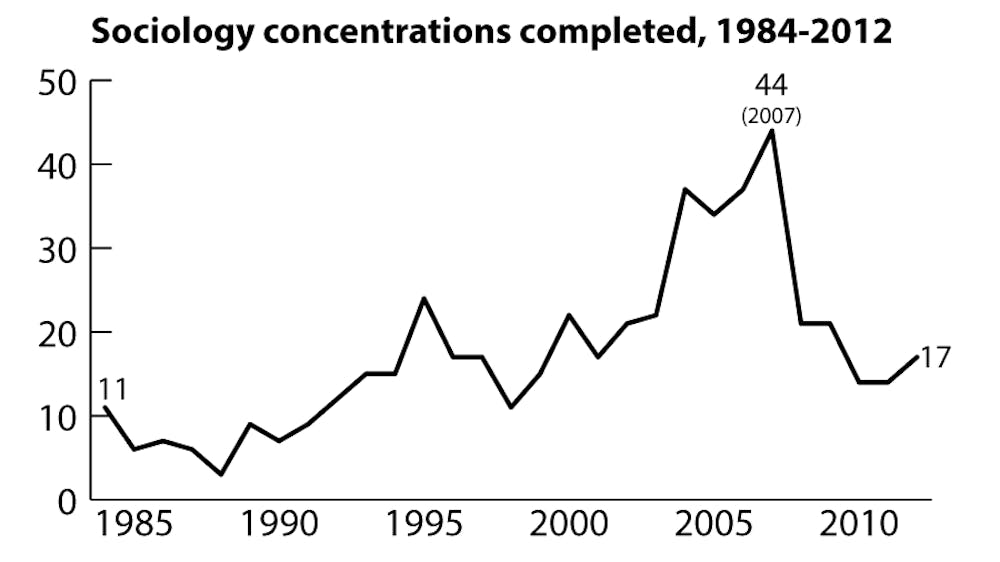The Department of Sociology has seen a decline in concentrators from 44 in the class of 2007 to 17 in the class of 2012, according to data obtained by The Herald from the Office of Institutional Research, but sociology faculty members and students indicated topics in sociology are being explored through different concentration programs.
Though there has been a 61 percent drop in sociology concentrations completed in the past five years, the C.V. Starr Program in Business, Entrepreneurship and Organizations has attracted more students who may have previously been drawn to concentrating in sociology, said Michael Kennedy, professor of sociology and international studies.
“We’re moving back up,” Kennedy said, noting that the class of 2012 had three more sociology concentrators completing degrees than the classes of 2011 and 2010, each of which had 14. Those years accounted for the lowest number of sociology degrees earned in recent history and represented a large drop from the mid-2000s.
Twenty sociology concentrators plan to graduate this spring, and there are currently 30 juniors concentrating in the department, Kennedy wrote in an email to The Herald.
The BEO program is sponsored by the departments of sociology and economics and the School of Engineering. BEO seeks to teach students “the methodological approaches of economics, sociology, engineering and entrepreneurship,” according to the program’s website.
From 2007-2008, the number of sociology degree recipients declined from 44 to 21, the single largest drop in the department’s concentrators since at least 1985, according to the data, which spans from 1984 to 2012. But this sharp decline was accompanied by large growth in BEO’s precursor, the former Commerce, Organizations and Entrepreneurship concentration, which saw a jump from ten concentrations completed in the class of 2007 to 50 in the class of 2008. These changes accounted for a net increase of 17 students who earned degrees in sociology-related disciplines, Kennedy said.
“We shouldn’t only be thinking about sociology,” Kennedy said, linking the rise in BEO concentrators to an increase in overall interest in sociology.
But some students said they were more drawn to BEO because of the concentration’s broader coverage of fields that extend beyond sociology.
“BEO offers a little more of an economics background,” said Matt Garofalo ’15, a BEO concentrator, calling the program more well-rounded than sociology. Though Garofalo said he still takes sociology courses as part of his concentration, he added that BEO appeals to many students because it “covers a much wider field” than sociology.
Wendy Rogers ’14, a sociology concentrator involved with the Sociology Departmental Undergraduate Group, said there is sometimes a perception that a sociology degree is “not very marketable” and dismissed as “softer” than a degree in BEO. But she disputed the accuracy of this view. “It’s never going to hurt to get a better understanding of how the world works,” she said.
Doubts about sociology’s marketability persist among students. “I think BEO strikes people as more practical than sociology,” wrote Steven Adler ’15, an economics concentrator, in an email to The Herald. Adler wrote he believed students who initially explore economics and statistics courses are often drawn to BEO because the program does not have many additional requirements outside these departments. Students assume that compared to a sociology concentration, a degree in BEO “will be taken more seriously,” Adler wrote.
Rogers said the sociology DUG is working to recruit more concentrators, noting that there is “lots of overlap” of material and interest with other departments and disciplines. She added that it makes sense that rising interest in BEO has corresponded with a drop in sociology concentrators, given the similar appeal of the subjects.
Students pursuing the sociology concentration indicated the department’s strengths come from its personalized focus on concentrators .
Sociology faculty members are interested in engaging students and providing “individualized” advising, said Eva Lindpaintner ’13, a double concentrator in sociology and education who is also a member of the sociology DUG. Lindpaintner said she believes double concentrators in sociology and another discipline are becoming more common because of the interdisciplinary nature of material taught in sociology courses.
“Our breadth is part of our appeal, but it’s also part of our challenge in making our presence known,” Kennedy said, adding that the number of students double concentrating in sociology and another field has risen in recent years to about half of current concentrators. Economics and disciplines in the health sciences are the most common for double concentrations with sociology, Kennedy wrote in an email to The Herald.
The inclusion of a sociology section on the new Medical College Admission Test has also spurred newfound interest in sociology from students considering medical school, Kennedy wrote. The new MCAT will take effect in 2015, The Herald previously reported.
Brendan McNally, associate director of the BEO program, highlighted the strong curricular connections between BEO and sociology. “If you’re interested in businesses or organizations, understanding theory, what motivates people, what is leadership — that is gold when you come out into the business world,” McNally said, adding that BEO courses often have sociology concepts “embedded” within them.
“More numbers (of concentrators) are definitely welcome,” Rogers said, citing the department’s relaxed academic and advising environment as valuable attributes that can “make students feel like they have a special place.”
-With additional reporting by Molly Schulson

ADVERTISEMENT




